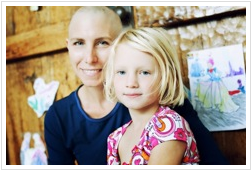Early detection saves lives. If you didn’t go to the grocery store in October or somehow managed to avoid the marketing genius of the Breast Cancer Awareness campaign, then this might be news to you. So here it is once again: get your annual mammogram and do a self-check.
But I have ovarian cancer. There is no encouraging message like that for this disease. Unlike breast cancer, ovarian cancer is very rarely detected in it’s early stages (under 30% are identified at stage II or earlier – and in most of those cases, it’s discovered by accident during another procedure or scan). There is no reliable screening for ovarian cancer. There is no self-check you can do. And it can’t be found with a pap smear. So what on earth are women supposed to do?
I am extremely lucky. I was diagnosed with stage II ovarian cancer, which means that with a full – everything but the kitchen sink – hysterectomy and aggressive chemotherapy for six months, I’ll be fine. I’ll see my kids grow up and most likely something else out there will kill me first. The prognosis for stages III and IV is not so sunny.
But finding ovarian cancer before it’s too late is hard to do. Doctors sometimes call it “the silent killer” because it is so often not found until it’s too late. Others have called it a symptomless disease. But that’s wrong. And it kind of makes me angry. That’s why I’m writing this.
Ovarian cancer is not symptomless. There are symptoms, they just aren’t extreme in nature and are often overlooked by women and their doctors. And I think more women need to know.
Taken separately, my symptoms were unremarkable. I wasn’t planning to call the doctor about them. I am 40 years old. I have some irritating aches and pains, but it never occurred to me that I could have something extreme like ovarian cancer. Make a doctor appointment? No thanks. Just had a pap smear a month ago. Really, I had other things to do.
But I did manage to tell a good friend about my unremarkable problems. She had recent knowledge of the disease and knew my complaints added up to something. She dragged my stubborn “don’t-worry-about-me-I’m-a-supermom” butt to the doctor by my collar. (Around here, this friend is commonly referred to as “The Amazing Super Mega Friend From Heaven” and I’m happily giving her my kidney, lung or bone marrow if she ever needs it.)
I then had the good fortune of having a great Ob/Gyn who also listened carefully to my list of concerns. She immediately had me do all the right scans and blood tests, and I was quickly turned over to an amazing Gynecologic/Oncologist.
Here’s a quick list of symptoms I had along with some others that could be a sign of cancer or other serious condition:
(1) Bloating that goes on and on and can’t be explained away every time by stress, your period, or a bad burrito
(2) The sensation of being constipated constantly
(3) Deep pain during sex
(4) A weird sensitivity or bulging around the abdomen
(5) Feeling full even when not eating much
(6) Urgently needing to pee despite not drinking much
(7) Fatigue that is more than the normal fatigue of daily life
See? These are fairly benign unpleasantries that can easily be explained away by other less serious things. But taken together – even just a few of them together – they indicate something significant. Doctors can’t add up your symptoms if you don’t tell them everything – and even then they may not give you the necessary ultrasound, biopsy, MRI or other scan. (A woman here in San Diego with stage III ovarian had to see seven doctors including a psychologist before someone finally did a biopsy.) Of course it’s neither wise nor necessary to assume the worst case scenario when you have symptoms like these. Women DO have a lot of weird things going on inside. But it is important to LISTEN to your body. TALK to other women. FIND a good doctor. And TRUST thyself. (And I highly recommend having sex now and then.)
Read this entire post by BreezyMama.com on the Clearity Portal by clicking here.



